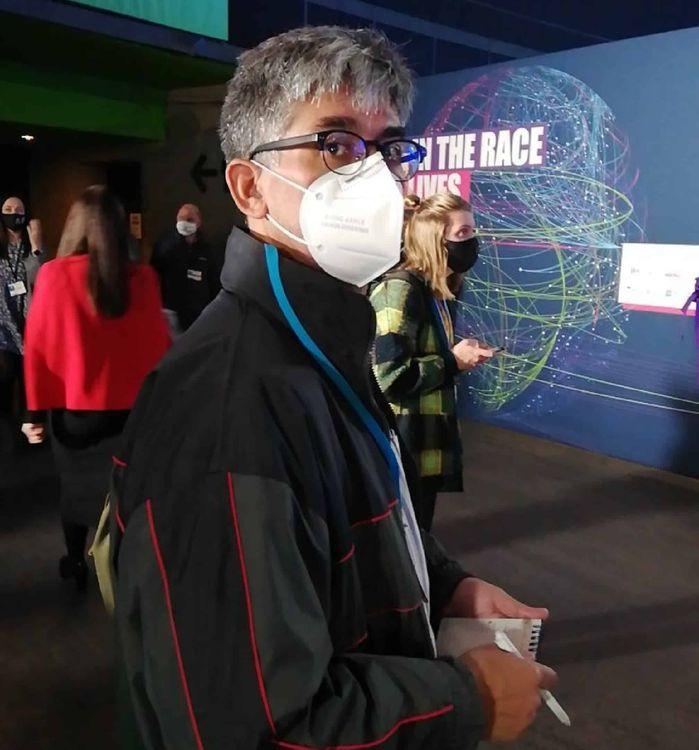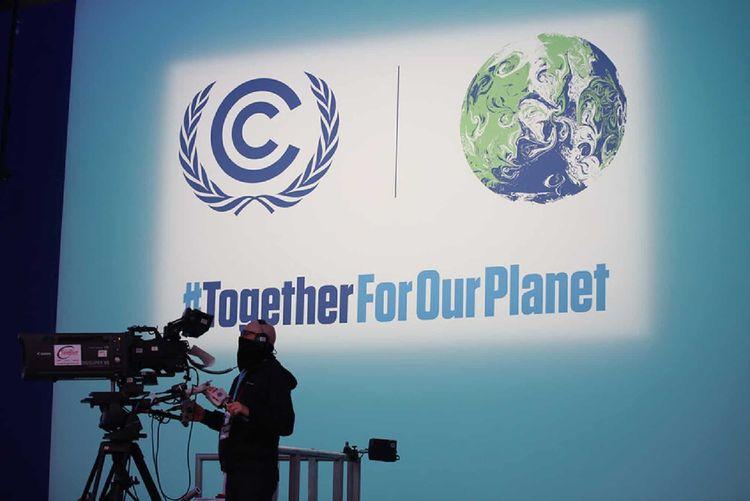Mexico's participation in the 26th Conference of the Parties (COP26) of the United Nations Framework Convention on Climate Change has been far from regional leadership and the assumption of greater commitments.
Instead, the role of the Mexican delegation in the climate conclave has revolved around the political agenda of the administration of President Andrés Manuel López Obrador, said the journalist, Emilio Godoy, who is covering the event in Glasgow, Scotland.
In an interview with Causa Natura, Godoy recounts the details of this event and the role of Mexico.

Emilio Godoy, correspondent in Glasgow, Scotland. Photo: Courtesy
— How important is an event like COP 26 for a Mexican citizen?
First, we must understand that the climate crisis affects transversally everything we do, how we mobilize, what we eat, where to live, we must have it in the first order. How the climate crisis affects us on a daily basis, including our health.
— What are the most relevant discussions?
Moving on to this twenty-sixth Climate Change Conference, there are very important issues for the planet, and so that developing countries can take action against the climate crisis, which are suffering the most from the effects of the crisis, such as droughts, intense storms and floods.
Then, the so-called operating rules of the Paris Agreement since 2015, one of the fundamental elements of the Agreement is the operation of the carbon bond market, that is, credits, which document that polluting emissions were avoided in ecosystems such as forest, minerals and even energy projects. The idea is to create a global market for these bonds that can be exchanged by countries, according to that level of reductions and the fundamental issues are precisely to define the operating rules of their markets.
Then another vital issue is the financing of the operation of the mechanism for losses and damages caused by the climate crisis, this is of vital importance especially for developing countries that are already suffering the ravages of the climate emergency, as I mentioned before.
— We have seen how some presidents try to lead the summit, but also absences. Among them is that of President López Obrador. What role has the Mexican delegation played in this summit?
Unfortunately, Mexico's role has been discreet, as it happened at the Madrid Climate Summit two years ago, it is the second smallest delegation in Latin America; the largest is Brazil.
There are worrying things, two in particular. One, Mexico has not joined the declaration against coal and the energy transition because of the energy policies that the López Obrador government is taking, which is to switch to fossil fuels.
And the other is that he doesn't want to make any more climate commitments either. An alliance of countries is being launched here in Costa Rica and Denmark to abandon fossil fuels, and it is clear that Mexico is not going to join. Any energy issue related to this Summit must have the endorsement of the Ministry of Energy, and we already know that implies that anything that goes against the model that Mexico is applying will not be endorsed by Sener from any point of view.
And then what points does Mexico come to defend, and here is Mexico's problem. He comes to defend things like Sowing Life, which is more of a labor, rural, than environmental program. However, Mexico comes here to defend it as part of so-called nature-based solutions, which is the use of ecosystems to combat the climate crisis.
There are no precise data from Sembrando Vida, there are some that were revealed days ago, but they are general and whose methodology is in doubt. So since there is a tendency to exaggerate the environmental benefits that are in any case hypothetical of Sowing Life and that should be clarified in a better way.
— What about climate commitments?
There are no major climate commitments, it will not improve the goals, we already knew that since the presentation of the new contribution determined at the national level. In other words, the goals that each country voluntarily assumes, Mexico did not improve its own. What's more, we don't know the methodology with which this climate policy has been calculated. And this week, after more than 2 years, the Special Program for Climate Change was finally published, as part of a bombastic campaign by Mexico about its policies.
— What role has the Secretariat of Environment and Natural Resources played in Mexico's participation?
Albores was not on the program, and after the meeting with the United States delegation in Mexico, when the special envoy for climate change John Kerry visited the country, then López Obrador called Albores and ordered him to come to Glasgow, then he will be on the program and tomorrow he will speak (November 10).
What's next, because we already know he's going to defend the Mexican climate program, he's going to defend Sowing Life, but those are not enough things and it's clear what the country is doing, and in fact that merit meant that yesterday a coalition of environmental organizations (Climate Action Network) awarded him second place in an award called Fossil of the Day.
— What is this anti-award about?
Every day of the Summit, this environmental network gives “recognition” in quotation marks to the actor who does the most to make the least progress in climate negotiations. The winner was Saudi Arabia for blocking the mention of human rights in a declaration called climate empowerment and in second place was Mexico because of its regressive energy policy and its lack of climate ambition.

Photo: Kiara Worth/ UNFCCC
— We saw that López Obrador suggested that the Declaration on Forests and Land Use (signed by 131 countries, including Mexico) emerged from Sowing Life. Was there any reaction to this?
No. That is not true. There is no evidence that the statement was based on Sowing Life. That's part of the propaganda to the government, of its policies, but there's nothing like that.
What should be said is that this statement stems from historic demands that indigenous people and community organizations have made.
And now finally all the parties to the Convention, the countries that are part of the convention in the Paris agreement, and international banks and financiers, have begun to take these calls with more interest and that is reflected in these types of statements, which are, of course, promises. There's nothing concrete yet and that's something we're seeing here. It remains to be seen if that will materialize or not. Beyond the final results, the first week we saw a menu of offers that need to be fulfilled, let's remember that many of these things are voluntary commitments, the declaration of forests, the declaration of energy transition, and so on, they are not a direct part of the convention, of the discussions, they are voluntary commitments.
The strong thing is this week, which is the draft text statement, and fundamental issues, as I mentioned at the beginning, of funding.
— Mexico insists that developed countries mobilize minimum 100 billion dollars annually, between 2020 and 2025. Are there conditions for it to work?
This is part of the most intense debates because this funding has been talked about for a long time. It was part of the Copenhagen Climate Summit and then Cancun. And what developing countries have asked for is that they be new funds, it doesn't help that already exist and it is concentrated within that bag of 100 billion and that has not even been reached.
There are signs that this goal will be achieved in terms of commitment, but we return to the usual issue: how is it going to be disbursed? , and who is going to receive it? But that is a long way from now, and on top of that, it is already late and its application horizon is going to extend.
— Is the country in a position to claim these resources?
It is indeed necessary for the developed countries that are the causes of the climate crisis to assume greater financial responsibilities. Especially the additional efforts of countries like Mexico. And here there is something called shared but differentiated responsibility. Mexico is not Panama, it's not Zambia, it's not a small country. Mexico is among the 20 largest historical polluters in the world.
Of course, it has a differentiated responsibility vis-à-vis Japan or the United States, but it doesn't mean that it's a small country, the problem is that Mexico is not fulfilling that differentiated responsibility, so with what moral authority is it going to demand that others do more or give more money, that's where the incongruity lies.
There are really very few who are doing their part to combat the climate crisis in terms of taking better measures and financing. It's not just Mexico. But with what moral authority Mexico is going to demand someone else if they are on the contrary route to the crisis we are experiencing, it is nonsense.



Comentarios (0)